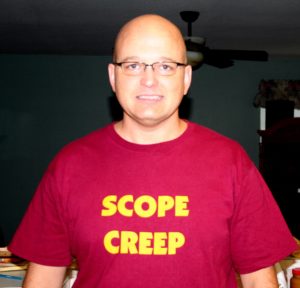Suburban schnauzer wrangling
This afternoon, I opened my garage doors, intending to get out some gardening supplies so I could work in the backyard. As I stepped out into the driveway, I saw a guy chasing a schnauzer down the sidewalk toward me. I stepped to the sidewalk, squatted down and held my hand out to the dog, hoping I could catch him.
But the dog was too wily; he barked at me, ran past me and kept going. I saw that the dog was out-pacing the man, so, I stepped back into the garage, grabbed a leash and my bicycle and joined the chase. A few seconds later my neighbor Chris from three houses down the street came up on his bicycle, and he joined the chase, too. Chris is out on his bike and rollerblades a lot, so I figured he was either already out riding or had also joined the chase as it passed his house.
The dog led us across the street and onto the sidewalk that goes behind our subdivision’s pool and tennis courts. At one point, Chris and I managed to get the dog between us with some shrubs on one side, but the dog dashed between the shrubs and into the parking lot.
On the other side of the parking lot, we kind of cornered the dog between the tennis courts and some other shrubs. Chris and I both dropped out bikes, and Chris managed to get on the other side of the dog. He then squatted, held out his hand and called the dog in a sweet voice. To my surprise, the dog responded. When he got close, Chris grabbed for his collar, but the dog wriggled away and came toward me. I tackled the dog and held onto him until Chris could also get a hold and we got the collar on him. When I tackled the schnauzer, he bit me and punctured my hand in one place.
Chris then told me that the dog chaser was his visiting brother-in-law, and that the dog has escaped from Chris’ house. He thanked me and walked the dog toward his house, and I rode home.
While I doctored my wound, I told Katie and the kids what had happened–laughing hysterically the whole time. A couple minutes later Chris came over to thank me again and to give me my leash. Turns out, he’d been bitten, too.
All in all, the suburban schnauzer wrangling was worth the dog bite. It was actually a lot of fun.




